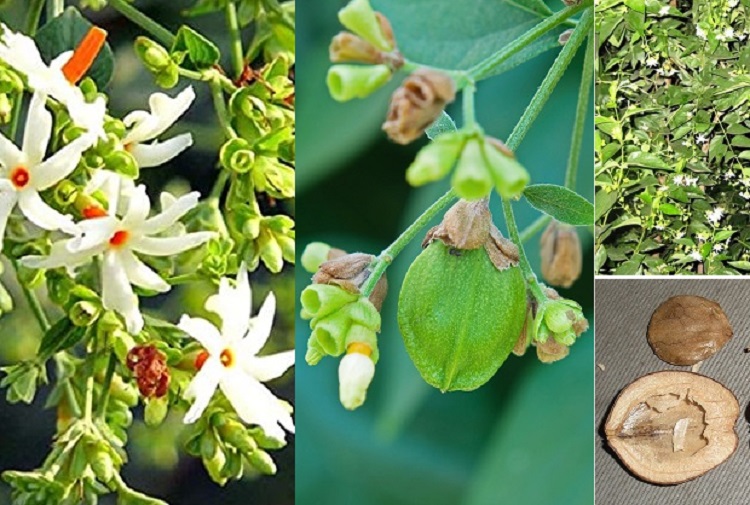PARIJAT

| संस्कृत: | पारिजातक, शेफालिका | ગુજરાતી: | પારિજાતક, હરશણગાર | |
| हिन्दी: | हारसिंगार | Binomial: | Nyctanthes Arbor-tristis |
Introduction:
The mythological story reveals that Parijat is a heavenly tree brought to earth by Lord Krishna and finds reference in Bhagwad Gita and Puran. Another story says that the tree was a princess Parijataka, she fell in love with the sun. But on rejection, she committed suicide. From her ashes, a tree grew in the form of the spirit of Parijakata. As she cannot see sight of his love ‘sun,’ she only flowers at night and sheds flower in the morning as a sign of tears.
Parijat or Harsingar is known as a night-jasmine, is a small shrub growing 20-25 feet high, having fragrant flowers. Leaves have small hairs on inner side. Parijat flowers have five to eight petals forming corolla arranged on an orange-red stem. Blooms at night and sheds all flowers before dawn. From leaves to the roots, the whole Parijat plant is useful in Ayurveda. Fruits are flat brown heart shaped to round capsule with two sections each containing a single seed.
Uses:
1. Fresh juice of leaves is useful in arthritis and sciatica.
2. Useful in treatment of dengue and chikungunya.
3. Paste of seeds is useful to treat dandruff and hair lice. Oil prepared from flowers is useful for longer and healthier hair.
4. Fresh juice of plant is useful in constipation, bloating, piles and intestinal worms.
5. Powder of dried leaves and bark or tea made of leaves and flowers is useful in treatment of cough, cold, bronchitis and asthma
6. Juice of leaves is useful on snake bite.
7. Bark extract is useful to treat fever, including malarial fever.
8. Flower extract is useful in treatment of skin diseases, removes dark skin and skin blemishes. Paste of leaves/bark is applied on eczema and ring worm.
9. Paste is useful on wounds and fractures.
10. Decoction of leaves and flowers is immunity booster.